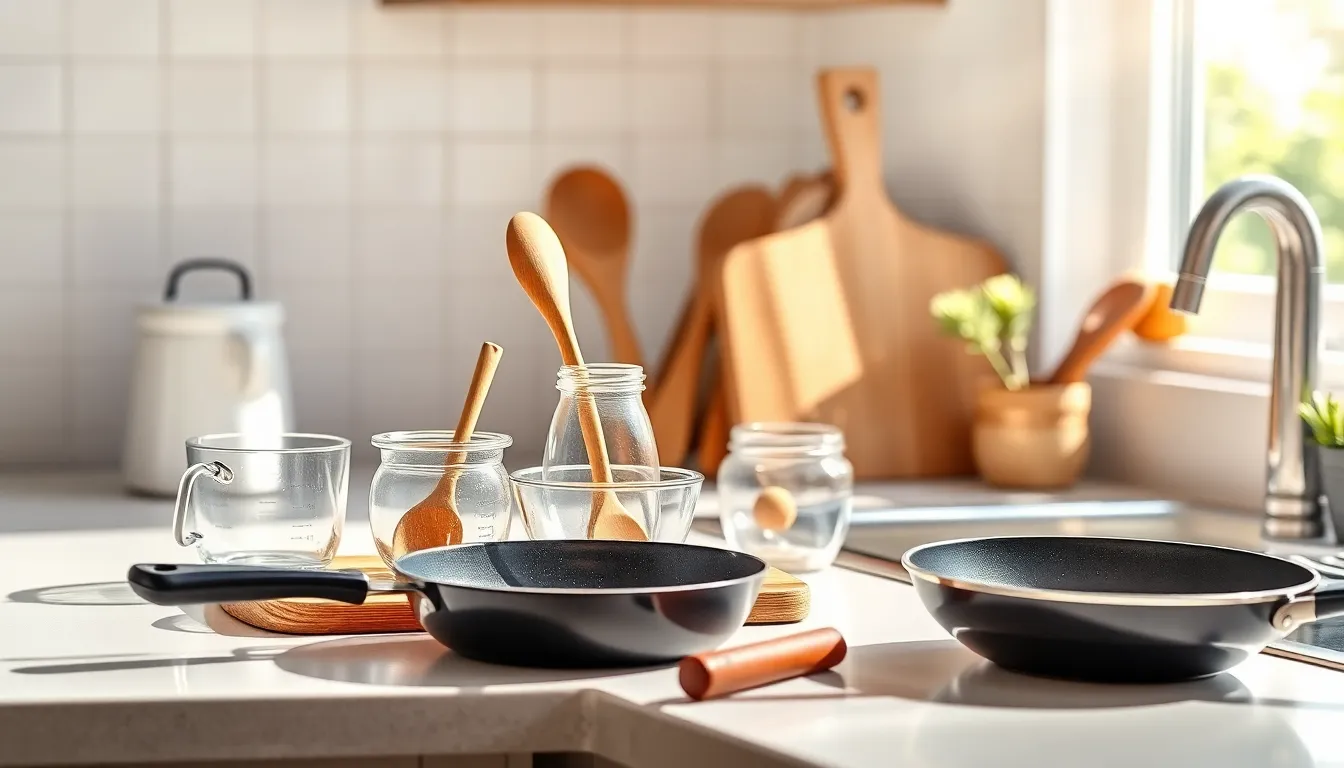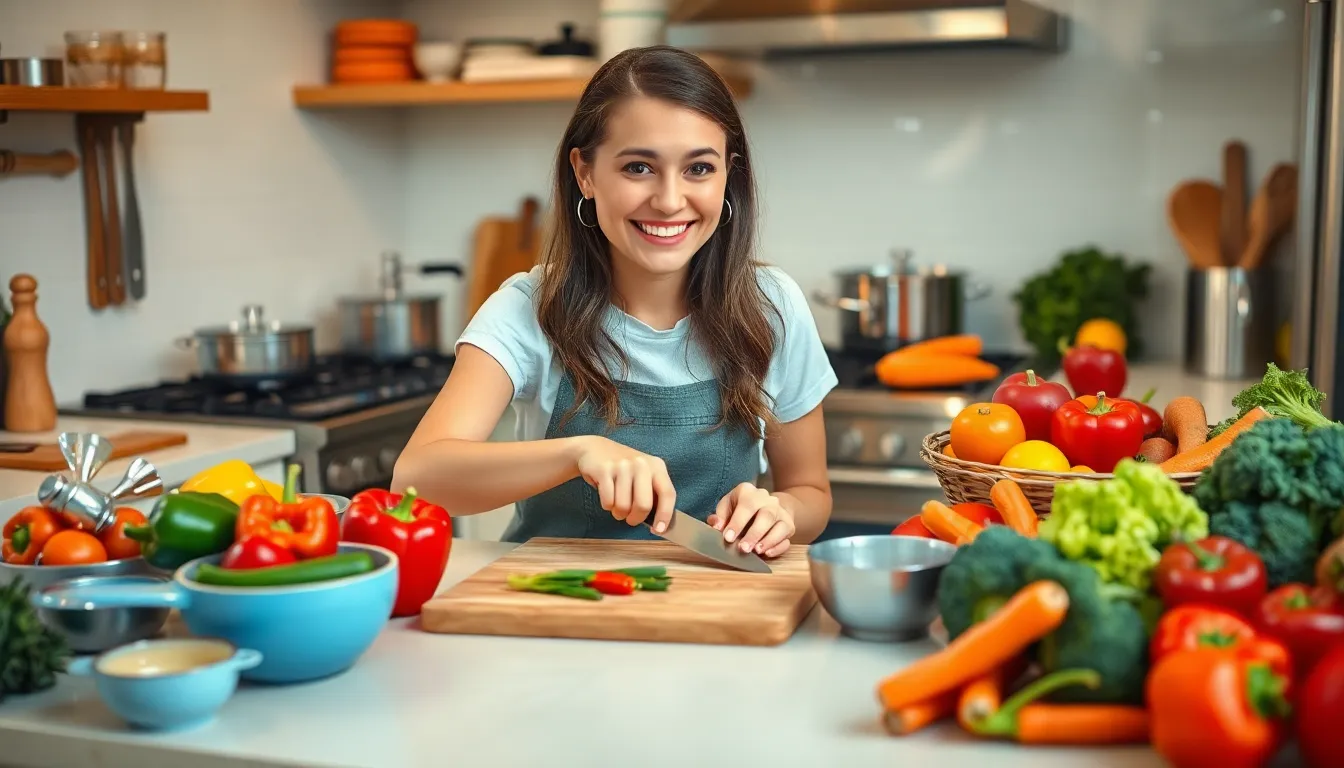Stepping into the kitchen for the first time can feel like entering a culinary battleground. With pots and pans that seem to have a mind of their own and ingredients that might as well be written in hieroglyphics, it’s no wonder many shy away from the stovetop. But fear not! Cooking doesn’t have to be a high-stakes drama; it can be a fun, delicious adventure.
Table of Contents
ToggleUnderstanding Basic Cooking Techniques
Gaining familiarity with basic cooking techniques empowers beginners to create delicious meals. Mastering essential methods simplifies the cooking process, boosting confidence in the kitchen.
Boiling and Simmering
Boiling involves heating water to the point of bubbling vigorously. It cooks ingredients quickly, making it suitable for pasta and vegetables. Simmering occurs at lower temperatures, allowing gentle cooking for dishes like soups and sauces. This technique enhances flavor while ensuring ingredients remain tender. Beginners should use a pot with a lid to maintain heat and moisture during these processes.
Sautéing and Stir-Frying
Sautéing requires cooking food quickly in a small amount of oil over medium-high heat. This technique develops rich flavors and browning in vegetables and proteins. Stir-frying uses high heat and constant stirring to cook thinly sliced ingredients rapidly. A wok or a large skillet works best for this method. Using fresh ingredients increases the dish’s taste, while garlic and ginger often enhance flavor profiles.
Baking and Roasting
Baking involves cooking food with dry heat in an oven. This method is essential for bread, pastries, and casseroles. Roasting, however, typically applies to meats and vegetables, using higher temperatures to create a caramelized exterior. Both techniques benefit from even heat distribution, so preheating the oven is critical. Additionally, monitoring cooking times ensures optimal doneness while preserving the dish’s moisture and flavor.
Essential Tools for Cooking

Every beginner needs a few essential tools to feel comfortable in the kitchen. A well-equipped space simplifies the cooking process and enhances the overall experience.
Must-Have Kitchen Utensils
Measuring cups and spoons ensure accuracy when following recipes. A sturdy cutting board provides a safe surface for chopping vegetables and meats. A sharp chef’s knife facilitates precise cuts and meal prep. Mixing bowls help combine ingredients effectively. Wooden spoons allow for stirring without scratching cookware, while a spatula can flip or serve food with ease. Having potholders on hand protects hands from hot surfaces. Each utensil contributes to efficiency and enjoyment while preparing meals.
Choosing the Right Cookware
Nonstick pans work well for easy cooking and cleanup. Cast iron skillets distribute heat evenly and are versatile for various cooking methods. Stainless steel pots and pans are durable, perfect for boiling or sautéing. A slow cooker can simplify meal preparation by allowing dishes to cook slowly throughout the day. Invest in baking sheets and pans for oven-friendly recipes. The right cookware encourages experimentation and encourages beginners to try new recipes confidently.
Tips for Mastering Cooking Techniques
Beginners can enhance their cooking skills by focusing on a few key strategies.
Reading Recipes Effectively
Reading recipes effectively simplifies the cooking process. Understand each step and ingredient before starting. Pay attention to the list of ingredients and measurements to ensure accuracy. Familiarize yourself with cooking terms like sauté, simmer, and preheat, as they define different methods. Take note of preparation times to better manage your cooking pace. If a recipe seems overwhelming, break it down into smaller steps. This approach makes complex dishes more achievable and enjoyable.
Timing and Temperature Control
Timing and temperature control play a crucial role in cooking success. Mastering how long to cook different foods prevents undercooking or burning. Use a timer to keep track of cooking durations, ensuring dishes finish as intended. Understanding temperature settings on ovens and stovetops improves consistency in results. For example, sauces often require low heat to meld flavors without scorching. Gradually increase temperatures for tasks like searing or browning to develop richer flavors. Accurate temperature management transforms the cooking experience and enhances dish quality.
Practical Cooking Techniques for Beginners
Beginners can benefit significantly from mastering fundamental cooking techniques. Understanding these methods enhances confidence and efficiency in the kitchen.
Knife Skills and Food Preparation
Essential knife skills lay the foundation for efficient food preparation. Beginners should focus on holding the knife correctly to maintain stability and control. Common techniques include the pinch grip for safety and the rocking motion for chopping. Using a sturdy cutting board aids in precise cutting while preventing slips. Practicing these skills improves speed and effectiveness when preparing ingredients for various recipes. Handling a chef’s knife with confidence transforms the cooking experience and ensures safety during meal prep.
Techniques for Cooking Vegetables
Cooking vegetables properly preserves their flavor and nutrients. Beginners should explore methods like steaming, sautéing, and blanching. Steaming maintains texture and color, making vegetables vibrant and appealing. Sautéing in a small amount of oil allows for quick cooking while developing aromatic flavors. Blanching involves briefly boiling vegetables, followed by immediate cooling in ice water, which locks in bright colors and crispness. Experimenting with these techniques encourages a versatile approach to vegetable dishes, promoting healthy eating habits and culinary creativity.
Embarking on a culinary journey can be both exciting and daunting for beginners. With the right techniques and tools in hand, anyone can transform their kitchen experience. Emphasizing fundamental skills not only boosts confidence but also opens the door to endless culinary possibilities.
As they practice and refine their methods, beginners will discover that cooking is not just about following recipes; it’s about creativity and personal expression. By embracing these essential techniques and equipping their kitchens wisely, they can enjoy the process of cooking while creating delicious meals for themselves and loved ones.




